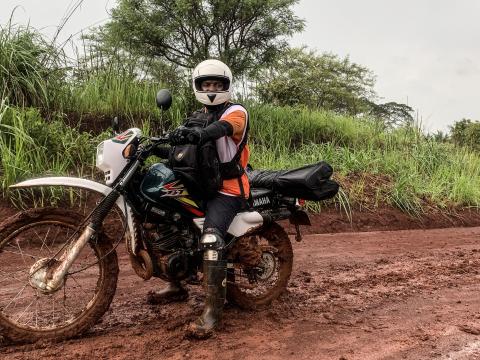Pacifique Musafiri: The Hero Who Pushes a Motorbike So That Children Can Live

Before dawn breaks, Pacifique Musafiri is already up, facing what serves as his road. Before him lies a long ribbon of yellow sand, sodden from the previous day's rain, which has become a trap where motorbikes sink... and sometimes even people. But Pacifique never gives up. In the Luiza and Luambo health zones, he is the Nutrition Officer for a project that fights chronic malnutrition. His role is to reach the children that no one sees, those who are almost inaccessible due to distance, sand, and fatigue. This means travelling 20 to 30 kilometres on unstable tracks, often by motorbike, sometimes on foot and very often pushing his motorbike for hours.
‘I can push the motorbike for 15 kilometres, but at the end of it, there's always a child waiting,’ he says with that calm smile that never leaves him.
At 8:10 a.m., his motorbike roars, moves forward a few metres, and then sinks mercilessly into the sand. He gets off, puts down his bag and begins his ritual: pushing, one step at a time, like a man who refuses to let the road decide for him. ‘Here, as soon as it rains, the road disappears and sometimes I push the motorbike for miles,’ he murmurs in a surprisingly soft voice.
Yet what makes the biggest impression is his smile.
‘When I know that at the end of the road, a child is waiting to be screened or a mother is waiting for an awareness session, fatigue no longer matters,’ he says.
A nurse in Luambo sums up what many are thinking:
‘Pacifique is a warrior of nature. The motorbike may give up, but he never does.’
Roads that separate, Pacifique reconnects
In Luambo, the fields hold out, but the roads give way at the first drops of rain. The sand becomes shifting, the slopes become slippery, and the descents become dangerous.
‘Sometimes the motorbike falls with me. Sometimes I have to unload the luggage and push again,’ he says, wiping the sweat already beading on his forehead. These tracks isolate entire families, delay care, and complicate everything except Pacifique's determination.
After eight kilometres of pushing the motorbike through the sand, Kabelekese finally appears. The women from the support group welcome us with songs and smiles that immediately lighten the burden of the journey. In the generous shade of a tree, a cooking demonstration begins. Pacifique observes, advises, and encourages. He has a discreet gentleness that restores confidence, an attentive gaze that values every gesture.
A mother says: ‘Even when we tell him the road is impassable, he comes. We've seen him push his motorbike on his own. He never abandons us.’
Further on, in a small brick room, community representatives from three health areas gather. Some have walked 10 to 18 kilometres to be there. They know the difficulties of the terrain, the dust, the sand, the slips and slides.
Pacifique opens the meeting calmly: ‘Screening a child is not about looking at a number. It's about knowing their history, knowing their mother's history, and knowing the obstacles in the field.’
They nod in agreement. They share the same language of silent effort and unwavering dedication.
At the end of the day, Pacifique hits the road again. Another sandy climb awaits him. Without hesitation, he gets off his motorbike, puts his hands on the handlebars, and pushes, pushes, pushes. The sun is setting, but his courage remains strong.
‘Children don't wait for the road to improve before they get sick,’ he says simply.
His name has become synonymous with consistency, endurance, and hope. Pacifique Musafiri is one of those humanitarian workers who do not speak loudly, but whose actions profoundly change the lives of communities in the Luambo health zone. He is a discreet, indispensable hero, an invisible pillar behind the 24,192 children who directly benefit from his project, implemented by World Vision DRC with support from the World Food Program and funding from KOICA.